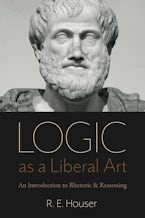- Home
- philosophy
- Logic as a Liberal Art
Preparing your PDF for download...
There was a problem with your download, please contact the server administrator.
Logic as a Liberal Art
An Introduction to Rhetoric and Reasoning
Imprint: Catholic University of America Press
In the twenty-first century there are two ways to study logic. The more recent approach is symbolic logic. The history of teaching logic since World War II, however, casts doubt on the idea that symbolic logic is best for a first logic course. Logic as a Liberal Art is designed as part of a minority approach, teaching logic in the "verbal" way, in the student's "natural" language, the approach invented by Aristotle. On utilitarian grounds alone, this "verbal" approach is superior for a first course in logic, for the whole range of students.
For millennia, this "verbal" approach to logic was taught in conjunction with grammar and rhetoric, christened the trivium. The decline in teaching grammar and rhetoric in American secondary schools has led Dr. Rollen Edward Houser to develop this book. The first part treats grammar, rhetoric, and the essential nature of logic. Those teachers who look down upon rhetoric are free, of course, to skip those lessons. The treatment of logic itself follows Aristotle's division of the three acts of the mind (Prior Analytics 1.1). Formal logic is then taken up in Aristotle's order, with Parts on the logic of Terms, Propositions, and Arguments.
The emphasis in Logic as a Liberal Art is on learning logic through doing problems. Consequently, there are more problems in each lesson than would be found, for example, in many textbooks. In addition, a special effort has been made to have easy, medium, and difficult problems in each Problem Set. In this way the problem sets are designed to offer a challenge to all students, from those most in need of a logic course to the very best students.
Rollen Edward Houser is the Bishop Wendelin J. Nold Chair in Graduate Philosophy at the University of St. Thomas Houston.
"There is a need for new textbooks in Aristoteilan logic for undergraduates and seminarians. An excellent presentation of logic as a liberal art, and it will serve students and instructors well. R.E. Houser's book fills a significant need."
~Brian T. Carl, Center for Thomistic Studies, University of St. Thomas, Houston
"Dr. Houser gives us more than a logic book; he gives us a liberal education. Of how many logic books can one say "It’s a good read"? His explanations are clear, not stuffy; his examples are clever and range from Cicero to Lincoln."
~David Foster, Athenaeum of Ohio
" Logic as a Liberal Art is an impressive work covering a wide range of topics intrinsic to logic. Houser’s talent for teaching is on display in the way he exhibits the core elements and benefits of studying logic. The text has something for everyone interested in logic, including college readers of all levels, starting with basic logical patterns and the structure of propositions, and culminating with showing how logic is the art of understanding and evaluating important philosophical positions. In that regard, this book is a primer on doing philosophy. The first appendix alone, which sets out a chronology of logicians and their works, makes this text worthwhile. A must-have for anyone who wishes to acquire or hone logical-analytic skills."
~Gregory J. Coulter, University of St. Thomas, Minn.
"The breadth and depth of this text are balanced by the skill of a seasoned scholar who engages all readers, from the novice to the near expert, with careful attention to complexities and with subtle and satisfying humor. As learned in the works of Aristotle and Avicenna as he is in those of Frege and Chesterton, R. E. Houser guides the reader to a deeper understanding of reality, step by step, through the intellectual freedom that is attained through a precise understanding of logic in all its richness. A masterpiece"
~Rev. Anthony E. Giampietro, The Catholic University of America
"There are many fine logic texts available today. Houser's book stands out for the way it explains the connections between the rules for sound thinking and the standard practices involved in ordinary language use. The exercises are terrific--likely to keep students engaged and learning a lot."
~Joseph Koterski, SJ, Fordham University
"Houser’s Logic as a Liberal Art has much to recommend it and little, if anything at all, against it. After working through it in a rigorous way, students are shown the groundlessness of Descartes’s opinion that Aristotle’s 'logic corrupts good sense rather than increasing it,' or Locke’s view that the human mind 'can reason without being instructed in methods of syllogizing.' I highly encourage instructors and students, of all levels, to consider using Houser’s book."
~Thomistica.net

